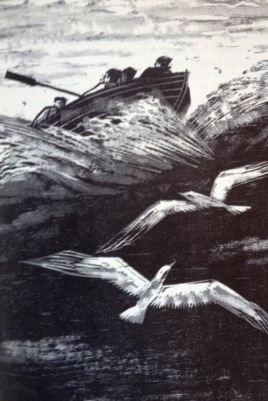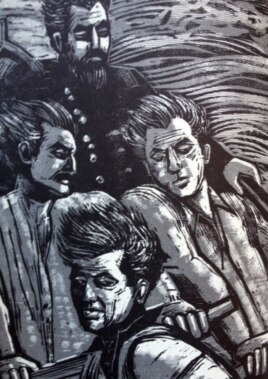Our story today is called “The Open Boat.” It was written by Stephen Crane and is based on what really happened to him in eighteen ninety-six.
Crane was traveling from the United States to Cuba as a newspaper reporter. One night, his ship hit a sandbar. It sank in the Atlantic Ocean, off the coast of Florida. Most of the people on board got into lifeboats. Crane was among the last to leave. There were three others with him: the ship’s captain, the cook, and a sailor.
These four men climbed into the only remaining lifeboat. The boat was so small that no one believed it could stay afloat for very long. None of the four men thought he would ever reach the shore. But the men fought the seas bravely, with all their strength. Would they finally reach land? Here is Shep O’Neal with the first part of the story.
The small lifeboat bounced from wave to wave in the rough seas of the Atlantic. The four men in the boat could not see the sky. The waves rose too high.
The waves with their white tops pushed at the open boat with angry violence. Every man thought each wave would be his last. Surely, the boat would sink and he would drown. The men thought that most adults would need a bathtub larger than the boat they were sailing. The waves were huge, and each created a problem in guiding the direction of the boat.
For two days, since the ship sank, the four men had been struggling to reach land. But there was no land to be seen. All the men saw were violent waves which rose and came fiercely down on them.
The men sat in the boat, wondering if there was any hope for them. The ship’s cook sat in the bottom of the boat. He kept looking at the fifteen centimeters which separated him from the ocean.
The boat had only two wooden oars. They were so thin – it seemed as if they would break against the waves. The sailor, named Billie, directed the boat’s movement with one of the oars. The newspaper reporter pulled the second oar. He wondered why he was there in the boat.
The fourth man was the captain of the ship that had sunk. He lay in the front of the small boat. His arm and leg were hurt when the ship sank. The captain’s face was sad. He had lost his ship and many of his sailors. But he looked carefully ahead, and he told Billie when to turn the boat.
“Keep her a little more south, Billie,” he said.
“A little more south, sir,” the sailor repeated.
Sitting in the boat was like sitting on a wild horse. As each wave came, the boat rose and fell, like a horse starting toward a fence too high to jump. The problem was that after successfully floating over one wave you find that there is another one behind it just as strong and ready to flood your boat.
As each wall of water came in, it hid everything else that the men could see. The waves came in silence; only their white tops made threatening noises.
In the weak light, the faces of the men must have looked gray. Their eyes must have shone in strange ways as they looked out at the sea. The sun rose slowly into the sky. The men knew it was the middle of the day because the color of the sea changed from slate gray to emerald green, with gold lights. And the white foam on the waves looked like falling snow.
As the lifeboat bounced from the top of each wave, the wind tore through the hair of the men. As the boat dropped down again the water fell just past them. The top of each wave was a hill, from which the men could see, for a brief period, a wide area of shining sea.
The cook said the men were lucky because the wind was blowing toward the shore. If it started blowing the other way, they would never reach land. The reporter and the sailor agreed. But the captain laughed in a way that expressed humor and tragedy all in one. He asked: “Do you think we’ve got much of a chance now, boys?”
This made the others stop talking. To express any hope at this time they felt to be childish and stupid. But they also did not want to suggest there was no hope. So they were silent.
“Oh, well,” said the captain, “We’ll get ashore all right.”
But there was something in his voice that made them think, as the sailor said: “Yes, if this wind holds!”
Seagulls flew near and far. Sometimes the birds sat down on the sea in groups, near brown seaweed that rolled on the waves. The anger of the sea was no more to them than it was to a group of chickens a thousand miles away on land. Often the seagulls came very close and stared at the men with black bead-like eyes. The men shouted angrily at them, telling them to be gone.
The sailor and the reporter kept rowing with the thin wooden oars. Sometimes they sat together, each using an oar. Sometimes one would pull on both oars while the other rested. Brown pieces of seaweed appeared from time to time. They were like islands, bits of earth that did not move. They showed the men in the boat that it was slowly making progress toward land.
Hours passed. Then, as the boat was carried to the top of a great wave, the captain looked across the water.
He said that he saw the lighthouse at Mosquito Inlet. The cook also said he saw it. The reporter searched the western sky.
“See it?” said the captain.
“No,” said the reporter slowly, “I don’t see anything.”
“Look again,” said the captain. He pointed. “It’s exactly in that direction.”
This time the reporter saw a small thing on the edge of the moving horizon. It was exactly like the point of a pin.
“Think we’ll make it, captain?” he asked.
“If this wind holds and the boat doesn’t flood, we can’t do much else,” said the captain.
It would be difficult to describe the brotherhood of men that was here established on the sea. Each man felt it warmed him. They were a captain, a sailor, a cook and a reporter. And they were friends. The reporter knew even at the time that this friendship was the best experience of his life.
All obeyed the captain. He was a good leader. He always spoke in a low voice and calmly.
“I wish we had a sail,” he said, “to give you two boys a chance to rest.” So they used his coat and one of the oars to make a sail and the boat moved much more quickly.
The lighthouse had been slowly growing larger. At last, from the top of each wave the men in the boat could see land. Slowly, the land seemed to rise from the sea. Soon, the men could see two lines, one black and one white.
They knew that the black line was formed by trees, and the white line was the sand. At last, the captain saw a house on the shore. And the lighthouse became even larger.
“The keeper of the lighthouse should be able to see us now,” said the captain. “He’ll notify the life-saving people.”
Slowly and beautifully, the land rose from the sea. The wind came again. Finally, the men heard a new sound – the sound of waves breaking and crashing on the shore.
“We’ll never be able to make the lighthouse now,” said the captain. “Swing her head a little more north, Billie.”
“A little more north, sir,” said the sailor.
The men watched the shore grow larger. They became hopeful. In an hour, perhaps, they would be on land. The men struggled to keep the boat from turning over.
They were used to balancing in the boat. Now they rode this wild horse of a boat like circus men. The water poured over them.
The reporter thought he was now wet to the skin. But he felt in the top pocket of his coat and found eight cigars. Four were wet, but four were still dry. One of the men found some dry matches. Each man lit a cigar. The four men sailed in their boat with the belief of a rescue shining in their eyes. They smoked their big cigars and took a drink of water.
Please come back next week for the second and final part of this story.
_____________________________________________________________
Words in This Story
lifeboat - n. a small boat that is carried on a ship and that is used for saving the lives of the passengers and crew if the ship sinks
seaweed - n. a type of plant that grows in the sea
oar - n. a long pole that is flat and wide at one end and that is used for rowing and steering a boat
ashore - adv. on or to the shore of an ocean, sea, lake, or river
brotherhood - n. feelings of friendship, support, and understanding between people
Now it's your turn. Write a comment on this story, using some of the words above.

